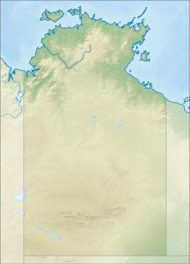Djukbinj National Park
| Djukbinj National Park Northern Territory | |
|---|---|
| Nearest town or city | Humpty Doo |
| Coordinates | 12°34′44″S 131°26′06″E / 12.579°S 131.435°ECoordinates: 12°34′44″S 131°26′06″E / 12.579°S 131.435°E |
| Established | 27 March 1997[1] |
| Area | 554.41 km2 (214.1 sq mi)[1] |
| Managing authorities |
|
| Website | Djukbinj National Park |
| See also | Protected areas of the Northern Territory |
Djukbinj National Park is a protected area in the Northern Territory of Australia located about 66 km (41 mi) east-south-east of the territory capital of Darwin.
The national park was proclaimed on 3 April 1997 over land which has previous protected area status and which was part of the Wulna Land Claim - portion 1386 which was the former Escape Cliffs Historical Reserve, portion 2012 which was the former Cape Hotham Forest Reserve, portion 2017 which was the former Cape Hotham Conservation Reserve, and portions 4498, 4499 and 4707 which were parts of the former Marrakai Conservation Reserve.[3]
After the settlement of the land claim, the Limilngan-Wulna Aboriginal Corporation leased the land back to the former Conservation Commission of the Northern Territory for it to use for "the purposes of a national park" following the signing of a joint management agreement on 7 November 1994.[2][3]
Part of the land within the former Escape Cliffs Historical Reserve includes the site of the first attempt by the Government of South Australia to create a settlement in the Northern Territory and which was listed on the Northern Territory Heritage Register on 12 January 2000 under the name of Escape Cliffs.[4][5]
See also[edit]
References[edit]
- ^ a b c "CAPAD 2012 Northern Territory Summary (see 'DETAIL' tab)". CAPAD 2012. Australian Government - Department of the Environment. 7 February 2014. Retrieved 7 February 2014.
- ^ a b Mazel, Odette (8 July 2003). "Deed of Management between Limilngan-Wulna Aboriginal Corporation and the Conservation Commission of the Northern Territory". ATNS - Agreements, Treaties and Negotiated Settlements project. Indigenous Studies Program, The University of Melbourne. Retrieved 1 May 2019.
- ^ a b "Place Names Register Extract for Djukbinj National Park". NT Place Names Register. Northern Territory Government. Retrieved 2 May 2019.
- ^ "Escape Cliffs". Heritage Register. Northern Territory Government. 12 January 2000. Retrieved 1 May 2019.
- ^ Baldwin, Timothy Denney (13 December 1999). "NORTHERN TERRITORY OF AUSTRALIA, Heritage Conservation Act, DECLARATION OF HERITAGE PLACE, ESCAPE CLIFFS". Heritage Register. Northern Territory Government. Retrieved 1 May 2019.
All that parcel of land near Cape Hotham in the Northern Territory of Australia containing an area of 2.18 hectares more or less being that part of Northern Territory Portion 1386 designated Northern Territory Portion 5799(A)
External links[edit]
| This Northern Territory geography article is a stub. You can help Wikipedia by expanding it. |
| This Australian protected areas-related article is a stub. You can help Wikipedia by expanding it. |

No comments:
Post a Comment